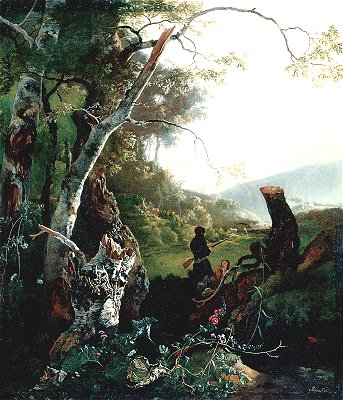 |
|
LANDSCAPE WITH HUNTERS
Adam Pynacker Dutch 1620-1673
SN 896 Oil on Canvas About
1665
by Robert Anderson
ARTIST
Adam Pynacker was a Dutch landscape painter who was active chiefly in Delft and Amsterdam.
He spent about three years in Italy, probably around 1645-48, and became one of the
outstanding Dutch exponents of Italianate landscapes. His style has a distinctive and
attractive silvery tonality and his early paintings show a first-hand knowledge of the
Italian terrain which was the subject of almost his entire output.
His early paintings were mostly small scale and reproduced specific
aspects of nature in minute detail while evoking the strong sunlight and atmosphere of
Italy. His palette was distinctive and cool. He often used the same compositional format :
one side built up with trees, hills and cliffs, balanced against a vista of slim trees,
distant hills and sky. The light is almost always that of a rising or setting sun.
Through the period of 1661-73 while in Amsterdam his larger size
paintings suggest that they were commissioned to decorate the interiors of large city
houses belonging to the newly wealthy middle classes. |
SUBJECT
The subject, as in most of Pynacker's works is an Italianate landscape
with two human figures (hunters) in the foreground. A deer or moose can be seen in the
middle distance ( center) along with what appears to be a man plowing behind an oxen, also
in the middle distance, but to the right.
PAINTING
This painting belongs to Pynacker's second period and was painted while
he was in Amsterdam probably about 1665. While the composition is based upon scenes of the
Roman Campagna painted by Jan Both, it is wilder and more agitated. The knarled growth in
the foreground was inspired by Jacob van Ruisdale. Here as in so many of Pynacker's works,
the massive forms of the hills are played against a decorative border of branches and
grass that frames the whole composition.
There is an almost surrealist intensity in the sharply contrasting
light in the painting. What might be a pessimistic mood is relieved however by the
sun-filled vista in the distance - Pynacker's wonderful mastery of light.
Finally this Ringling painting shows long, thin, graceful lines of
white paint which follow and exaggerate the curves of the various tree trunks.
HISTORICAL CONTEXT
The 17th century was the great age of landscape painting in Holland.
While van Ruisdale and others were depicting dunes, rivers and polders in Holland, other
Dutch artists flocked to Rome where they painted the countryside of Italy. Pynacker
belongs to this group of Netherlandish artists known as the Dutch Italianates.
The rise of the wealthy middle class based upon the strong Dutch
commercial empire which was international in scope provided a ready market for landscape
painting.
|